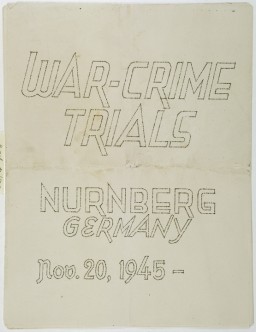You searched for: ������������������������������������������������cxfk69���page
<< Previous | Displaying results 71-80 of 177 for "������������������������������������������������cxfk69���page" | Next >>
-
Page from volume 1 of a set of scrapbooks documenting the German occupation of Denmark
ArtifactPage from volume 1 of a set of scrapbooks compiled by Bjorn Sibbern, a Danish policeman and resistance member, documenting the German occupation of Denmark. Bjorn's wife Tove was also active in the Danish resistance. After World War II, Bjorn and Tove moved to Canada and later settled in California, where Bjorn compiled five scrapbooks dedicated to the Sibbern's daughter, Lisa. The books are fully annotated in English and contain photographs, documents and three-dimensional artifacts documenting all…
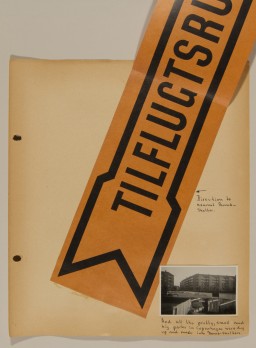
-
Page from volume 5 of a set of scrapbooks documenting the German occupation of Denmark
ArtifactPage from volume 5 of a set of scrapbooks compiled by Bjorn Sibbern, a Danish policeman and resistance member, documenting the German occupation of Denmark. Bjorn's wife Tove was also active in the Danish resistance. After World War II, Bjorn and Tove moved to Canada and later settled in California, where Bjorn compiled five scrapbooks dedicated to the Sibbern's daughter, Lisa. The books are fully annotated in English and contain photographs, documents and three-dimensional artifacts documenting all…
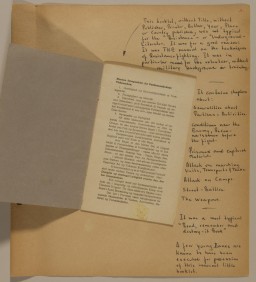
-
Page from volume 5 of a set of scrapbooks documenting the German occupation of Denmark
ArtifactPage from volume 5 of a set of scrapbooks compiled by Bjorn Sibbern, a Danish policeman and resistance member, documenting the German occupation of Denmark. Bjorn's wife Tove was also active in the Danish resistance. After World War II, Bjorn and Tove moved to Canada and later settled in California, where Bjorn compiled five scrapbooks dedicated to the Sibbern's daughter, Lisa. The books are fully annotated in English and contain photographs, documents and three-dimensional artifacts documenting all…
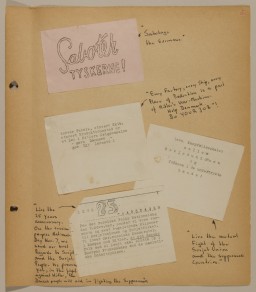
-
Leopold Page describes an act of sabotage and clandestinely listening to radio broadcasts while in Bruennlitz
Oral HistoryLeopold was a teacher in Krakow, Poland, when World War II began in 1939. While serving in the Polish army, he was captured by Germans. Leopold escaped from a prisoner-of-war transport. Soon after, he met the German industrialist Oskar Schindler. The two became friends. Leopold was forced to live in the Krakow ghetto. He later worked in Schindler's factory in Bruennlitz. He and the other Jews who worked there were treated relatively well and protected from the Nazis. After the war, Leopold moved to the…
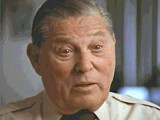
-
Ludmilla Page describes sabotage during production of munitions in Oskar Schindler's factory in Brünnlitz
Oral HistoryLudmilla was born to an assimilated Jewish family in Kishinev, Romania. She and her mother, a physician, were living in Poland when the Germans invaded on September 1, 1939. They were taken to Krakow. Ludmilla was forced to live in the Krakow ghetto; her mother was sent to the Warsaw ghetto. Ludmilla worked in a factory at the Plaszow labor camp for a businessman who was a friend of the German industrialist Oskar Schindler. In October 1944, Schindler attempted to save some Jewish workers by relocating them…
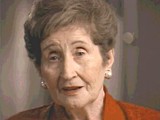
-
Ludmilla Page describes a celebration of Oskar Schindler's birthday in Bruennlitz toward the end of the war
Oral HistoryLudmilla was born to an assimilated Jewish family in Kishinev, Romania. She and her mother, a physician, were living in Poland when the Germans invaded on September 1, 1939. They were taken to Krakow. Ludmilla was forced to live in the Krakow ghetto; her mother was sent to the Warsaw ghetto. Ludmilla worked in a factory at the Plaszow labor camp for a businessman who was a friend of the German industrialist Oskar Schindler. In October 1944, Schindler attempted to save some Jewish workers by relocating them…
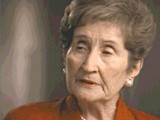
-
Ludmilla Page recalls arriving in Auschwitz instead of Oskar Schindler's munitions factory in Brünnlitz
Oral HistoryLudmilla was born to an assimilated Jewish family in Kishinev, Romania. She and her mother, a physician, were living in Poland when the Germans invaded on September 1, 1939. They were taken to Krakow. Ludmilla was forced to live in the Krakow ghetto; her mother was sent to the Warsaw ghetto. Ludmilla worked in a factory at the Plaszow labor camp for a businessman who was a friend of the German industrialist Oskar Schindler. In October 1944, Schindler attempted to save some Jewish workers by relocating them…
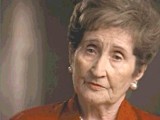
-
Booklet about International Military Tribunal
ArtifactFourth and fifth pages of a program booklet distributed during the International Military Tribunal at Nuremberg. Page four defines the charges of war crimes and crimes against humanity. The fifth page begins the list of IMT defendants. Handwritten notes in the margin record each defendant's sentence as it was read aloud in the courtroom.
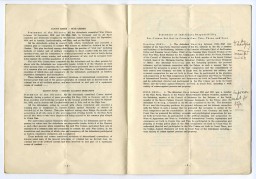
-
Ben Hecht
ArticleAmerican-Jewish journalist and author Ben Hecht co-wrote the We Will Never Die pageant and advocated for the rescue of Jewish victims from Nazism. Learn more.
-
International Military Tribunal program
Media EssayCover and pages from a mimeographed program booklet distributed at the International Mili...
